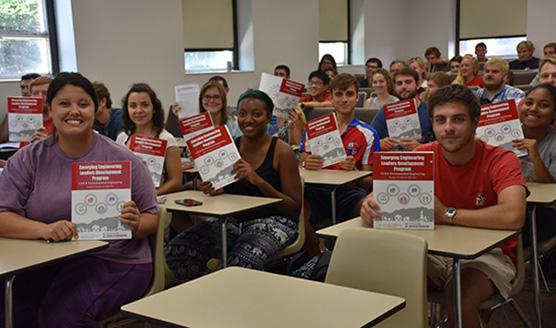A group of University of Georgia civil and environmental engineering students will enter the workforce with both a degree and leadership training designed to help them transition from student to professional.
This year, the J.W. Fanning Institute for Leadership Development partnered with the College of Engineering on a pilot program called the Emerging Engineering Leaders Development Program.
Jason Christian, an assistant professor in the engineering college, and Stephan Durham, assistant dean for student success and outreach and an associate professor of civil engineering for the college, enlisted the Fanning Institute to create and deliver the program as part of their Capstone Senior Design course for seniors majoring in civil and environmental engineering.
Durham said the engineering industry has identified leadership training as a real need.
While engineering is a very technical profession, Durham said a large part of the job does involve soft skills, or what he called “professional skills,” such as leadership and communication.
“The aspects and characteristics we want our students to have are strength in the professional skill set to go along with the wonderful technical education they are receiving here at UGA,” said Durham.
The Fanning Institute’s curriculum covered leadership vision and styles, group decision making, conflict management, communication, and community engagement.
According to Senior Public Service Associate Jenny Jordan, the Fanning Institute designed the program around what students will likely encounter at their future workplace.
“What companies are saying they need more than anything are students who have seen these kinds of skills and that have spent some time looking at how they manage conflict, how they understand their own strengths and weaknesses, how they engage with the community, how they interact with different generations, and how they make teamwork and communication happen,” said Jordan.
Hailey Hebebrand, a senior from Atlanta graduating in May with a degree in civil engineering, is among the 55 students who participated in the inaugural leadership program.
“Because we are upperclassmen and often considered the leaders of the college, it’s important to remember that we must learn how to lead in different ways once we start our full-time jobs,” said Hebebrand. “We must lead by example and be team members before advancing into positions of leadership.”
She felt the most valuable lesson taught dealt with generational differences in the workplace.
“The exercise allowed us to better understand how we should interact with co-workers of multiple generations in order to succeed in our jobs,” said Hebebrand. “Without having this perspective, it would be difficult to successfully lead a diverse group of people.”
The leadership training was integrated into the capstone projects for the civil and environmental engineering students, which require the students to work in groups on a real-world engineering design project in a community. Capstone projects are required as part of each undergraduate degree program in the engineering college.
Christian and Durham grouped students in their class based on their identified leadership styles, and they said the groups felt more cohesive and seemed to manage conflict more effectively.
A Fanning Institute faculty and staff team that included Jordan, Lauren Healey, Brendan Leahy, Brandy Walker, Lori Tiller, Emily Boness, and Dessa Morris worked on the program.
Durham and Christian said the Fanning Institute did a fabulous job, and they want to see this program expanded from just their course, which was the only one to include the leadership program, to the entire College of Engineering.
“This training is so impactful,” Christian said. “It really could be the difference between a graduate that has a good workplace experience leading to a very satisfying career versus a student that goes to work and gets frustrated because they don’t know these characteristics about themselves, they haven’t practiced leading, and they haven’t seen good leadership in action.”

